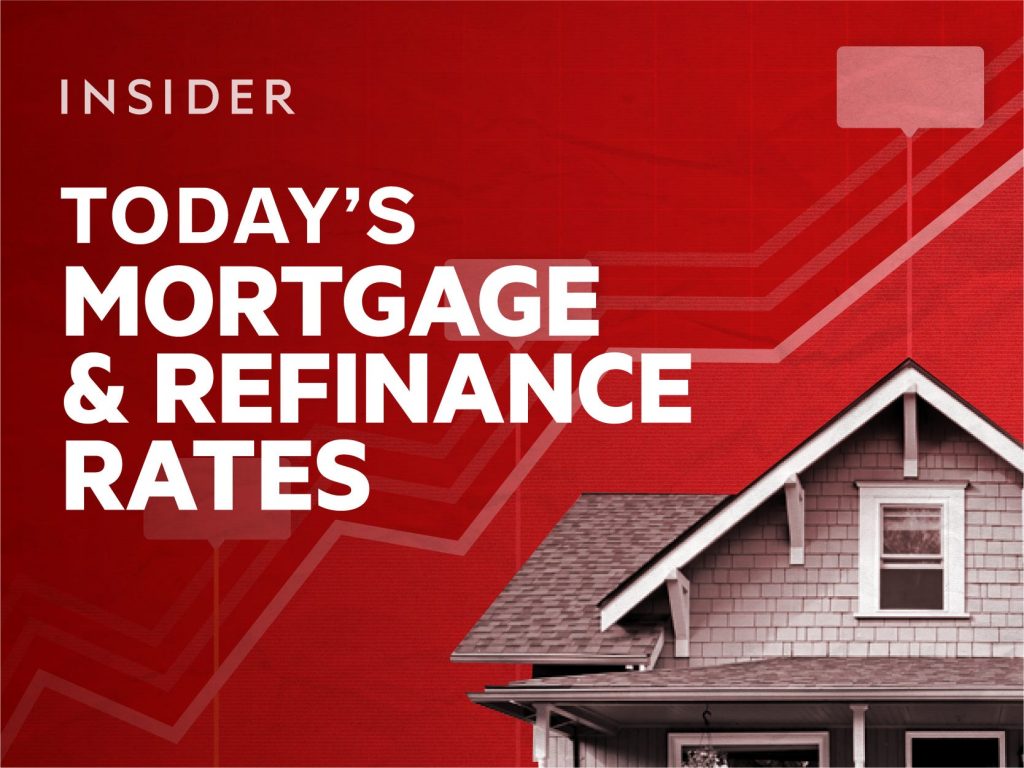Last week, the average 30-year fixed mortgage rate hit 4.72%, a high not seen since late 2018, according to Freddie Mac. By some measures, rates have already surpassed 5%.
Rates are expected to continue to increase this year. This is partly due to inflation and the
Federal Reserve
winding down pandemic-era policies that kept mortgage rates at record lows.
Today’s mortgage rates
Today’s refinance rates
Mortgage calculator
Use our free mortgage calculator to see how today’s interest rates will affect your monthly payments:
Mortgage Calculator
%
$1,161
Your estimated monthly payment
- Paying a 25% higher down payment would save you $8,916.08 on interest charges
- Lowering the interest rate by 1% would save you $51,562.03
- Paying an additional $500 each month would reduce the loan length by 146 months
By clicking on “More details,” you’ll also see how much you’ll pay over the entire length of your mortgage, including how much goes toward the principal vs. interest.
Are mortgage rates going up?
Mortgage rates started ticking up from historic lows in the second half of 2021, and will likely continue to increase throughout 2022.
In February, the Consumer Price Index reached an annual rate of 7.9%, the fastest rate of inflation since 1982. The Federal Reserve has been working to get inflation under control, and plans to increase the federal funds target rate six more times this year, following a 0.25% increase at its March meeting.
Though not directly tied to the federal funds rate, mortgage rates are often pushed up as a result of Fed rate hikes. As the central bank continues to tighten monetary policy to lower inflation, it’s likely that mortgage rates will remain elevated.
What do high rates mean for the housing market?
When mortgage rates go up, home shoppers’ buying power decreases, as more of their anticipated housing budget has to go toward paying interest. If rates get high enough, buyers can get priced out of the market completely, which cools demand and puts downward pressure on home price growth.
There’s such a shortage that even if 50% of the people stop looking today, you would still have a high demand.Ralph DiBugnara, president of Home Qualified and senior vice president of Cardinal Financial
However, that doesn’t mean home prices will fall — in fact, they’re expected to rise even more this year, just at a slower pace than what we’ve seen in the past couple years.
Even though high rates slow demand, low inventory will keep pushing prices up, says Ralph DiBugnara, president of Home Qualified and senior vice president of Cardinal Financial.
“There’s such a shortage that even if 50% of the people stop looking today, you would still have a high demand,” DiBugnara says. “So I just think that because of that demand, you’re going to see prices rise for at least another 18 to 24 months.”
What is a good mortgage rate?
It can be hard to know if a lender is offering you a good rate, which is why it’s so important to get preapproved with multiple
mortgage lenders
and compare each offer. Apply for preapproval with at least two or three lenders.
Your rate isn’t the only thing that matters. Be sure to compare both what your monthly costs would be as well as your upfront costs, including any lender fees.
Even though mortgage rates are heavily influenced by economic factors that are out of your control, there are some things you can do to help ensure you get a good rate:
- Consider fixed vs. adjustable rates. You may be able to get a lower introductory rate with an adjustable-rate mortgage, which can be good if you plan to move before the intro period ends. But a fixed rate could be better if you’re buying a forever home because you won’t risk your rate going up later. Look at the rates your lender offers and weigh your options.
- Look at your finances. The stronger your financial situation, the lower your mortgage rate should be. Look for ways to boost your credit score or lower your debt-to-income ratio, if necessary. Saving for a higher down payment also helps.
- Choose the right lender. Each lender charges different mortgage rates. Picking the right one for your financial situation will help you land a good rate.
Molly Grace
Mortgage Reporter
Molly Grace is a reporter at Insider. She covers mortgage rates, refinance rates, lender reviews, and homebuying articles for Personal Finance Insider.
Before joining the Insider team, Molly was a blog writer for Rocket Companies, where she wrote educational articles about mortgages, homebuying, and homeownership.
You can reach Molly at [email protected], or on Twitter @mollythegrace.
Laura Grace Tarpley, CEPF
Personal Finance Reviews Editor
Laura Grace Tarpley is a personal finance reviews editor at Insider. She edits articles about mortgage rates, refinance rates, lenders, bank accounts, and borrowing and savings tips for Personal Finance Insider. She is also a Certified Educator in Personal Finance (CEPF).
She has written about personal finance for six years. Before joining the Insider team, she was a freelance finance writer for companies like SoFi and The Penny Hoarder, as well as an editor at FluentU. You can reach Laura Grace at [email protected].
See below for some of her work.
Today’s 30-year mortgage rates
Here are the best mortgage lenders right now
The pros and cons of paying off your mortgage early
The best online high-yield savings accounts
Chase checking accounts: Compare all 5 options
Learn more about how Personal Finance Insider chooses, rates, and covers financial products and services »
